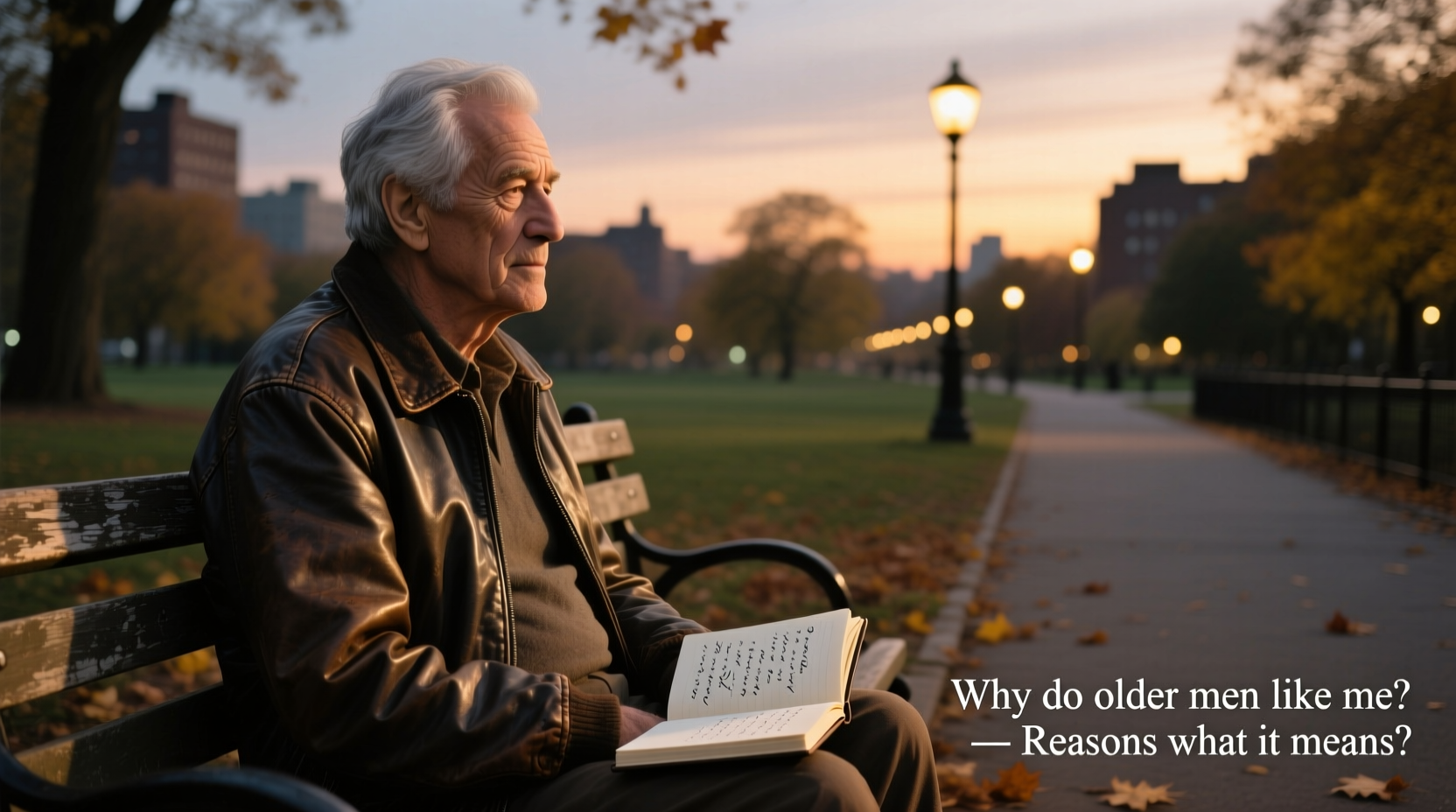Attraction doesn’t always follow a predictable path. If you’ve noticed that older men are consistently drawn to you—whether romantically, conversationally, or emotionally—it’s natural to wonder why. This dynamic is more common than many realize, and while it can be flattering, it also raises questions about intent, emotional maturity, and long-term compatibility. Understanding the underlying motivations behind this attraction helps you make informed decisions about your relationships and sense of self-worth.
The Psychology Behind Older Men’s Attraction to Younger Individuals

Age-gap relationships have existed across cultures and eras, but modern social shifts have made them more visible. When an older man expresses interest in someone significantly younger, it’s rarely about age alone. Instead, several psychological and emotional factors come into play.
One key driver is the concept of self-extension—the idea that people seek partners who help them feel more alive, relevant, or connected to youth. For some older men, engaging with a younger person symbolizes vitality, novelty, and a break from routine. It's not necessarily about romanticizing youth, but about reclaiming a sense of possibility.
Another factor is life stage contrast. Many older men have achieved financial stability, emotional clarity, and professional success. They may now seek companionship that feels unburdened by career pressures or identity confusion—qualities they associate with younger individuals. This isn't inherently negative; it can reflect a desire for simplicity and authenticity.
“Attraction across generations often reflects complementary needs: one partner seeks grounding, the other seeks inspiration.” — Dr. Lena Torres, Relationship Psychologist
Common Reasons Why Older Men Are Drawn to You
Your appeal to older men likely stems from a combination of personal traits, energy, and subconscious signals you project. Here are the most frequent reasons:
- You radiate enthusiasm and curiosity. Younger individuals often approach life with openness and eagerness to learn—qualities that can be refreshing to someone who has settled into a more structured existence.
- You offer emotional availability. Unlike peers who may be guarded after past relationships, you might express feelings more freely, making you seem emotionally accessible.
- You represent change or reinvention. An older man at a transitional point—post-divorce, mid-career shift, or empty-nester phase—may see a relationship with you as symbolic of a new chapter.
- You challenge their perspectives. Your generational outlook on technology, culture, or values can stimulate intellectual engagement, which can be deeply attractive.
- You embody physical vitality. While superficial, physical attraction plays a role. Youth often correlates with high energy, active lifestyles, and a certain aesthetic that aligns with societal ideals.
What This Attraction Means—And What It Doesn’t
Being liked by older men doesn’t automatically mean you’re more mature, exotic, or superior. It simply indicates alignment with certain relational dynamics. Interpreting this attention correctly is crucial.
It may mean:
- You possess qualities that complement what he lacks—energy, spontaneity, optimism.
- He respects your independence and sees you as an equal, not a project.
- The connection is rooted in mutual growth, not power imbalance.
It may not mean:
- That he wants a serious, long-term partnership.
- That he sees you as his emotional equal—he may unconsciously expect you to adapt to his world.
- That the relationship will be free of societal judgment or internal conflict.
Real Example: A Pattern Recognized Too Late
Sophie, 27, found herself repeatedly approached by men in their 40s and 50s—colleagues, mentors, even family friends. At first, she felt flattered. One man, David, 48, pursued her with charm and generosity. He introduced her to art galleries, took weekend trips, and spoke of “learning from each other.” But over time, Sophie noticed he dismissed her opinions on politics, expected her to adjust her schedule around his, and avoided introducing her to his close friends. She realized he wasn’t seeking a partner—he was seeking a companion who enhanced his lifestyle without challenging it. Recognizing this pattern helped her set boundaries and eventually walk away.
Navigating Relationships with Older Men: A Practical Checklist
If you're involved with or considering a relationship with an older man, use this checklist to assess its health and sustainability:
- ✅ Evaluate emotional reciprocity: Do you both share vulnerabilities, or is the emotional labor one-sided?
- ✅ Discuss future goals: Are your visions for family, career, and lifestyle compatible?
- ✅ Observe how he handles disagreement: Does he listen, or dismiss your perspective as “inexperience”?
- ✅ Assess social integration: Are you included in his world, or kept separate from important parts of his life?
- ✅ Reflect on power dynamics: Who makes decisions? Who adjusts more?
- ✅ Talk about age openly: How does he view the gap? Is it a source of pride, secrecy, or humor?
| Aspect | Healthy Sign | Red Flag |
|---|---|---|
| Communication | Respects your views, even when different | Interrupts, lectures, or calls you “naive” |
| Decision-Making | Seeks your input on plans and finances | Makes major choices without consulting you |
| Social Life | Introduces you to friends and family naturally | Keeps the relationship hidden or compartmentalized |
| Conflict Style | Willing to apologize and repair | Withdraws or uses age as justification (“You wouldn’t understand”) |
When the Age Gap Works—and When It Doesn’t
Many age-gap relationships thrive. The key is mutual respect, shared values, and emotional parity. Consider these two contrasting scenarios:
- Success Story: Maya, 30, and James, 52, met through volunteering. Both valued community work, travel, and intellectual discussion. James admired Maya’s drive; Maya appreciated James’s patience and wisdom. They married after three years, blending families and supporting each other’s goals.
- Unbalanced Dynamic: Liam, 45, began dating 23-year-old Chloe shortly after his divorce. He paid for everything, planned all dates, and subtly discouraged her from pursuing grad school, saying, “You’ll have time for that later.” Chloe eventually realized she was being molded into a version of a partner that suited Liam’s comfort zone—not her own growth.
The difference lies not in age, but in whether both individuals are growing together—or if one is being shaped to fit the other’s narrative.
Frequently Asked Questions
Is it normal for older men to prefer younger partners?
Yes, it’s common—but not universal. Evolutionary psychology suggests some men are biologically inclined toward youth as a signal of fertility, but modern relationships are driven more by emotional and social factors than biology alone. Social norms, media portrayals, and personal history also shape preferences.
Could an older man genuinely love someone much younger?
Absolutely. Love transcends age when it’s based on mutual respect, shared values, and deep emotional connection. However, genuine love requires effort from both sides to bridge potential gaps in life experience, energy levels, and long-term planning.
Am I being used if an older man likes me?
Not necessarily. Intent matters. Some older men seek meaningful connections, while others may want validation, convenience, or control. Pay attention to actions: consistent effort, transparency, and inclusion indicate sincerity. Secrecy, pressure, or condescension are warning signs.
Final Thoughts: Know Your Worth, Define Your Boundaries
Being attractive to older men isn’t something to question yourself over—it’s a reflection of your presence, energy, and individuality. But attraction alone isn’t a foundation for lasting connection. What matters is how that interest is expressed, whether it’s reciprocal, and whether it supports your growth rather than limits it.
Don’t confuse attention with affection, or charm with commitment. Ask hard questions early. Listen to your instincts. And remember: the right relationship won’t require you to shrink yourself to fit someone else’s idea of balance.









 浙公网安备
33010002000092号
浙公网安备
33010002000092号 浙B2-20120091-4
浙B2-20120091-4
Comments
No comments yet. Why don't you start the discussion?